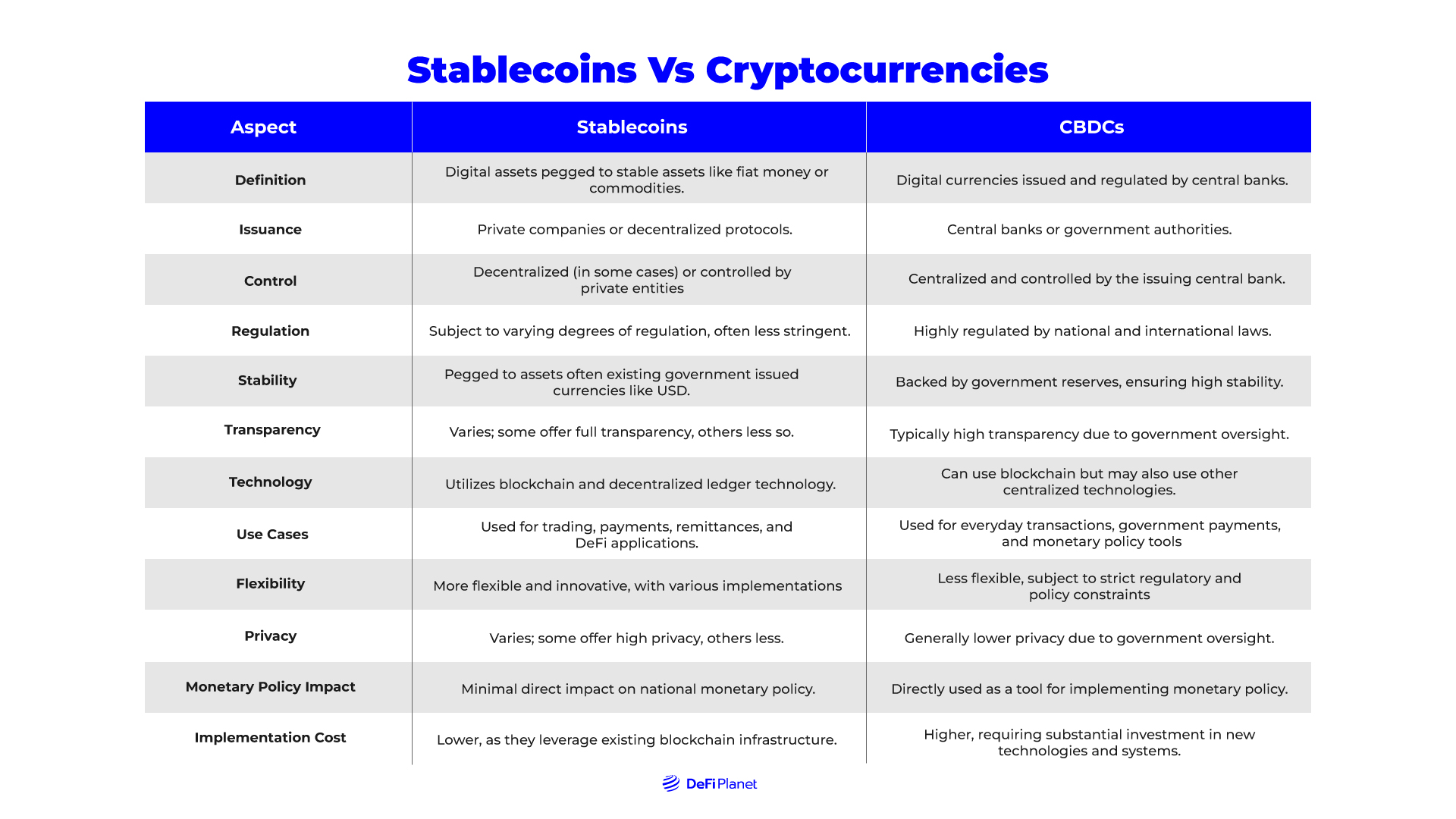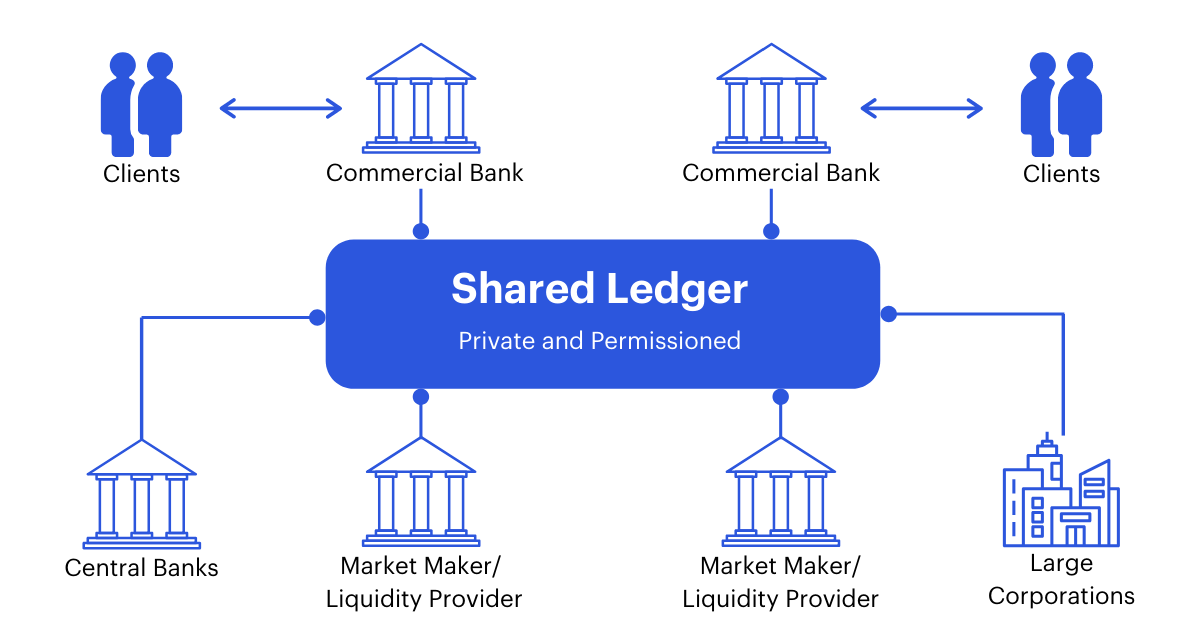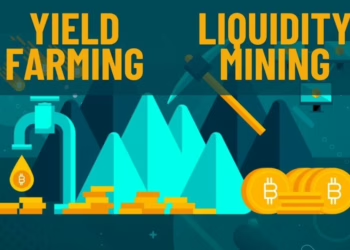Last updated on September 7th, 2025 at 11:20 pm
The hard truth is that the rise of Central Bank Digital Currencies (CBDCs) will change how we see, control, and use cryptocurrencies. Though both concepts usher us into that future where digital money is a reality, they do so in very different paradigms.
And the consequences of which one wins out (even though it might not and should not be a zero-sum game) will say a lot about how we spend money and, consequently, how we live—whether in perpetual fear of the State/Government apparatus, complete trust of it, or in a trustless society but prone to the whims of individuals seeking to undermine it.
In this article, we will examine these consequences from the dimension of CBDCs’ implications for cryptocurrencies. We will try to answer four specific questions that paint a picture of these impacts. Let’s get to it.
Do CBDCs Have Implications For The Crypto Industry?
According to the Bank of International Settlements, almost every country in the world is currently exploring the option of (or actively) developing a Central Bank Digital Currency (CBDC). The reason often cited for this is to provide a reliable digital currency recognized as legal tender—or a “safer” and “government-controlled” alternative to cryptocurrencies. It all depends on who you ask.
Basically, CBDCs are digital versions of a country’s official currency backed and issued by the central bank. They share every characteristic with cryptocurrencies except that they are not managed in “a decentralized manner.”

CBDC transactions, like cryptocurrencies, occur electronically and are facilitated by blockchain or similar technology. They are also managed through digital wallets. But unlike cryptocurrencies, their supply, demand, and other economic driving forces are overseen by the central bank or authorized entities.
In essence, according to the BIS, CBDCs are the next stage in the evolution of monetary systems. They will replace the traditional systems and show the true potential of tokenization and blockchain technology, and more importantly, do what the flawed system of cryptocurrencies could not and cannot do.
RELATED: Crypto vs CBDCs: Challenging the BIS Perspective on the Future of Money
However, given the gravity of this assertion and the extent of the reach of cryptocurrencies and its impact in ushering in or demonstrating this future of money, a question pops up: how does this development impact cryptocurrencies? What are the implications of CBDCs for cryptocurrencies?
1. Regulatory Influence
Introducing CBDCs will likely lead to stricter cryptocurrency regulations. Governments may impose rigorous oversight to control monetary policy and financial stability, including more stringent anti-money laundering (AML) and know-your-customer (KYC) requirements.
Crypto exchanges, stablecoin issuers, and other similar platforms and businesses might need to comply with new standards similar to those for CBDCs, which could increase compliance costs and complexity.
2. Competition
CBDCs present significant competition to cryptocurrencies in digital payments. They offer the same conveniences, such as fast and easy transactions. For instance, CBDCs can simplify cross-border transactions by eliminating intermediaries, reducing fees, and hastening transfers. This is one of the biggest use cases for cryptocurrencies, especially stablecoins.
While CBDCs could work alongside them, they could also control the market. For instance, someone sending money abroad might choose between using a cryptocurrency and a CBDC based on speed, cost, and ease of use. The need for cryptocurrencies will reduce drastically unless newer cases are found.
3. Pressure of Innovation
With CBDCs providing a regulated alternative, crypto developers might strive to distinguish their products by introducing unique features that CBDCs lack. While this push for innovation may lead to the advancement of DeFi apps, better privacy measures, and increased focus on decentralized governance, this constant need for innovation to keep pace highlights the long-term implications of CBDCs for the crypto industry.
It could strain resources and potentially slow industry growth, which collectively cannot muster the resources the government can at once. Developing new features and technologies demands substantial time, effort, and financial investment, diverting resources from other areas of development.
4. Trust and Adoption
This is the elephant in the room. The official endorsement, perceived safety, and implementation of CBDCs might attract users away from cryptocurrencies, especially those new to digital currencies or seeking low-risk options. The government’s backing and stability make them more appealing to users who are wary of cryptocurrency volatility and regulatory uncertainties.
Related: Opportunities and Challenges (Pros and Cons) of CBDCs
Will CBDCs Lead to a Ban on Cryptocurrencies?
The likelihood of CBDCs leading to a ban on cryptocurrencies is uncertain and depends on several factors, including regulatory approaches, government policies, and public sentiment.
Some regulatory bodies may view CBDCs as a means to regulate and control the digital currency space, potentially leading to restrictions on other cryptocurrencies.
However, the decentralized nature of many cryptocurrencies may present challenges for outright bans, as any single entity or government does not control them.
Regulatory measures and restrictions on specific aspects of cryptocurrency usage could emerge as CBDCs gain prominence, such as tighter regulations on cryptocurrency exchanges and trading platforms. Restrictions on particular cryptocurrency use cases and requirements for increased transparency and compliance with anti-money laundering (AML) and know-your-customer (KYC) regulations could occur.
What CBDCs Could Mean for Stablecoins?
Stablecoins are a lot like CBDCs, but there’s a key difference: they’re not issued by the government and don’t have the direct support of authorities. Instead, they’re linked to the value of regular money, just like CBDCs. For example, stablecoins like USDT, TUSD, USDC, and BUSD are tied to the value of the US dollar. They’re set at a ratio of 1:1, meaning one stablecoin equals one US dollar.
Stablecoins Vs Cryptocurrencies

CBDCs are practically direct competitors to stablecoins, especially because they offer similar features such as stability, reliability, and government backing. Users may prefer CBDCs over stablecoins due to their perceived safety and reliability. If this happens, the stablecoin projects’ liquidity and market demand will be hit hard, and their continued growth will be in danger.
Also, if regulators adopt this view, they could impose stricter regulations on stablecoin issuance, operation, and use. This regulatory environment will also affect the growth and development of stablecoin projects.
However, can CBCDs better combat financial exclusion than stablecoins? Click the link to read a detailed analysis of that scenario.
Do CBDCs require blockchain technology?
No. Central Bank Digital Currencies (CBDC) can use blockchain or distributed ledger technology (DLT), but it’s not a must, and it mostly wouldn’t be the type you are familiar with even if it is used, for the following reasons:
-
Centralized Control
CBDCs are digital currencies issued and controlled by central banks operating within existing financial systems. To maintain control over the issuance, distribution, and management of CBDCs, central banks may opt for centralized databases or technology solutions. Blockchain technology, while offering decentralization, may not align with the centralized control that central banks prefer.

-
Privacy and Confidentiality
While blockchain offers transparency and immutability, it also presents challenges regarding privacy and confidentiality. Central banks will always want to protect sensitive data, such as transaction details and account balances. CBDC crypto with centralized databases or other technologies may offer better solutions for maintaining privacy and confidentiality.
-
Scalability
Blockchain technology, especially public blockchains, faces scalability issues when processing large transaction volumes. Central banks may require a payment system that can handle multiple transactions quickly and efficiently. Centralized systems can often provide better scalability than decentralized blockchain networks, at least at the current state of the technology.
-
Technological Maturity
While blockchain technology has advanced significantly in recent years, it is still relatively new compared to traditional centralized systems. Central banks may prefer to rely on proven technologies with established reliability and security track records for critical financial infrastructure.
We might have to point out that rolling out CBDCs worldwide would need hefty investments in tech infrastructure, and cryptocurrencies are well on their way to developing, but that’s nothing when the powers that be are ready to mobilize to achieve a similar goal.
Related: Reasons Countries With Weak Currencies Should Not Develop CBDCs
Final Thoughts
There you have it: CBDCs are a big deal for the global financial system, and they have serious implications for the crypto industry, remittance services, DeFi projects, and platforms that tokenize assets using crypto and blockchain tech.
Ironically, the very reasons that CBDCs could hurt cryptocurrencies are the ones that could pave the way for their broader acceptance. As people become more familiar with digital money through CBDCs, they might become more open to exploring and embracing cryptocurrencies, ensuring a bright future for the crypto industry.
Imagine a country where CBDCs are as easy to use as cash or a bank account. They could be stable, secure, and trusted because the government backs them, and those concerned about crypto volatility or regulations might prefer them. However, governments have acknowledged that freezing financial assets can exclude individuals from society and that CBDCs could expedite this process because they link citizens directly to the government. And also because they could enable policies like negative interest rates that potentially diminish the individual’s autonomy over their finances.
So yes, CBDCs could reshape the dynamics of the crypto and stablecoin market, but they could just strengthen its need to survive. Experiencing CBDCs might lead people to prefer complete control over their money. This is exactly why it might not be a zero-sum game. What a good thing that would be.
READ MORE: The Role of Cryptocurrencies Amid Global Geopolitical Unrest
Disclaimer: This article is intended solely for informational purposes and should not be considered trading or investment advice. Nothing herein should be construed as financial, legal, or tax advice. Trading or investing in cryptocurrencies carries a considerable risk of financial loss. Always conduct due diligence.
If you would like to read more articles (news reports, market analyses) like this, visit DeFi Planet and follow us on Twitter, LinkedIn, Facebook, Instagram, and CoinMarketCap Community.
“Take control of your crypto portfolio with MARKETS PRO, DeFi Planet’s suite of analytics tools.”




















